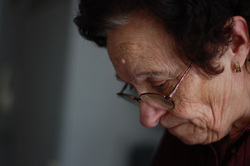 In addition to National Family Caregivers Month, November is of special importance for individuals and families experiencing Alzheimer's Disease. I've found that commonly, the term "Alzheimer's" is misunderstood. I've heard people breaking it down as "Alzheimer's -- Alt, like "Old" in German, as in, Old Timer's".. as if it was a normal part of aging. The thing is, it's not. The name Alzheimer's originated in 1901, when German psychiatrist Alois Alzheimer identified the first case of what came to be known as Alzheimer's Disease. The Alzheimer's Association website provides great information and resources. Below are the basics about Alzheimer's. Click here for the full website. Alzheimer's is a type of dementia that causes problems with memory, thinking and behavior. Symptoms usually develop slowly and get worse over time, becoming severe enough to interfere with daily tasks.
Alzheimer's and dementia basics
1 Comment
|
Details
AuthorTamara will be posting about topics relevant to caregivers and seniors. More conversations take place on our Facebook Page. Archives
April 2015
Categories
All
|
 RSS Feed
RSS Feed